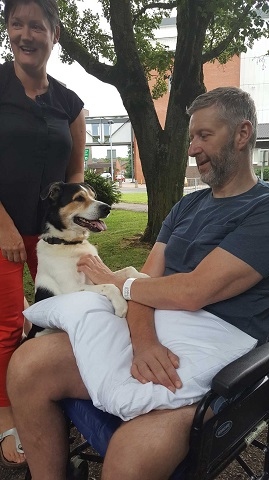How stroke and neuro rehabilitation care helped Middleton man make a first-class recovery
Date published: 30 October 2019

Mark Bebbington who made an amazing recovery thanks to the leading stroke and neuro rehabilitation care he received
Following World Stroke Day this week (Tuesday 29 October) midwife Clare Bebbington is helping to raise awareness by sharing the story of the amazing recovery her husband, Mark Bebbington, made following treatment at the Northern Care Alliance NHS Group’s (NCA) hospitals in Salford, Bury and Rochdale.
Claire has praised the care her husband Mark received from the NCA after he suffered a middle cerebral artery (MCA) stroke on 28 June, aged 50.
Previously Mark was a fit and well person who undertook triathlons. The stroke he suffered resulted in him being unable to speak, walk, or perform any independent tasks, such as standing, washing, eating etc.
Initially Mark was in Salford Royal then transferred to Fairfield General Hospital.
As part of the new Greater Manchester Stroke Model, Fairfield General Hospital provides a dedicated hyper-acute stroke unit, together with two 20 bedded dedicated acute/stroke rehabilitation units, comprising a full multi-disciplinary team.
Mark moved to Wolstenholme Intermediate Care Unit at Rochdale Infirmary on the 23 August under the care of the team there with support from the Community Stroke & Neuro Rehabilitation Team.
Wolstenholme Unit is staffed with; Registered nurses, Physiotherapists (who work closely with service users to identify realistic and functional goals to promote independence), Occupational therapists (who will work with service users to ensure the discharge home to a safe environment is achieved with aids and adaptations as required), GPs and Assistant Practitioners (who work closely with service users under the supervision of the therapy team) and a dedicated team of care support staff.
While on Wolstenholme, Mark was supported to regain some of his independence.
The physiotherapy he received has helped him to be able to stand with just the support of one person and safely transfer from bed to chair. The team also helped to source a powered wheelchair for Mark to use at home, helping to support his independence.
With the support of the Speech and Language Therapists, Mark’s speech has returned.
Mark still has cognitive issues - short term memory problems and is unable to remember tasks until undertaken on numerous occasions with positive reinforcement, but his recovery with the support of trained NHS professionals has been very positive.
Clare said: “The care Mark has received has been amazing.
“Wolstenholme unit is an extremely special unit with fabulous staff.
“The Community Stroke & Neuro Rehabilitation Team have been outstanding and extremely supportive in a time when we had no hope of Mark regaining any independence.
“We will be forever grateful for the support from the team. In the very bleak times of his recovery they have given us hope. The physiotherapy he has received has supported Mark to recover more than we ever expected or were led to believe he would.”
Mark was very keen to return home when he was discharged from hospital, this was made possible by rapid adaptations being made to his home by Rochdale Council who installed ramps and rails within 48 hours to support his discharge. This intervention was only possible due to integrated working in Rochdale with Adult Social Care colleagues from Rochdale Council working with NHS professionals.
Ashleigh Knowles, Clinical Lead for Integrated Stroke & Neuro-rehabilitation in Heywood, Middleton & Rochdale, said: “This has been a unique and fantastic collaborative effort involving the Community Stroke & Neuro Rehabilitation Team; the Wolstenholme Unit; Posture & Mobility Service; Adult Care, and Neurology delivering joined up care in a timely way to provide intensive neuro-rehabilitation that resulted in meaningful and important outcomes to Mark and family.
“Most importantly, this has resulted in a successful discharge to his family home avoiding a residential placement. This has been a real privilege to work in this manner.”
If you suspect that you or someone else is having a stroke, phone 999 immediately and ask for an ambulance.
The main symptoms of stroke can be remembered with the word FAST:
- Face – the face may have dropped on 1 side, the person may not be able to smile, or their mouth or eye may have dropped.
- Arms – the person with suspected stroke may not be able to lift both arms and keep them there because of weakness or numbness in 1 arm.
- Speech – their speech may be slurred or garbled, or the person may not be able to talk at all despite appearing to be awake; they may also have problems understanding what you're saying to them.
- Time – it's time to dial 999 immediately if you see any of these signs or symptoms.
One in four of us is at risk of stroke in our lifetime, but most strokes can be prevented by taking a few simple steps.
Keep an eye on your weight, limit alcohol, stop smoking, get your blood pressure checked regularly and take regular exercise. Don’t be the one.
The NCA brings together Salford Royal and Pennine Acute trusts and runs four Care Organisations; Salford, Oldham, Bury & Rochdale and North Manchester.
Do you have a story for us?
Let us know by emailing news@rochdaleonline.co.uk
All contact will be treated in confidence.
Most Viewed News Stories
To contact the Rochdale Online news desk, email news@rochdaleonline.co.uk or visit our news submission page.
To get the latest news on your desktop or mobile, follow Rochdale Online on Twitter and Facebook.

